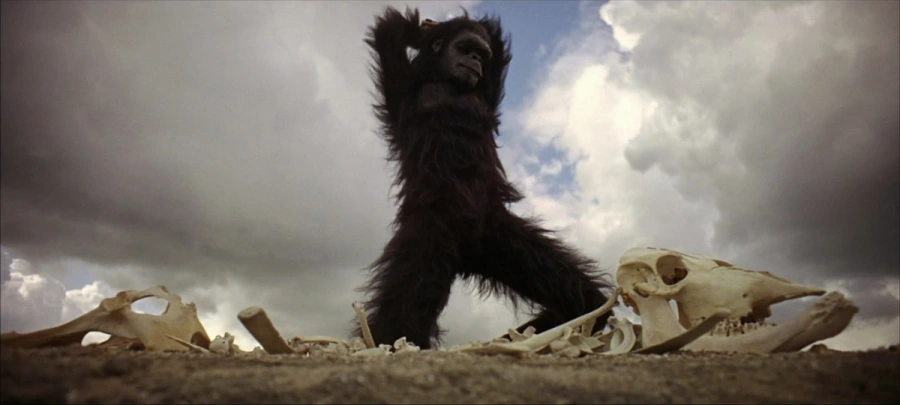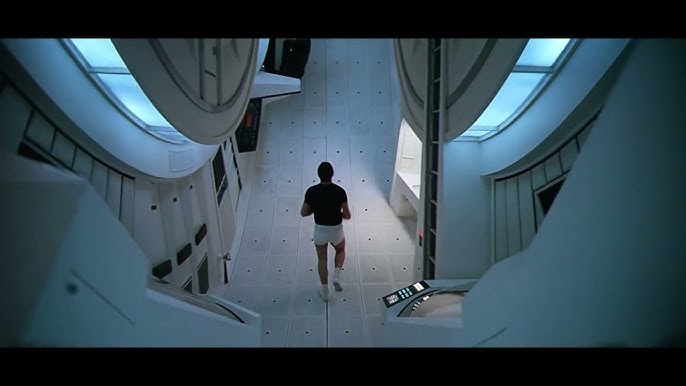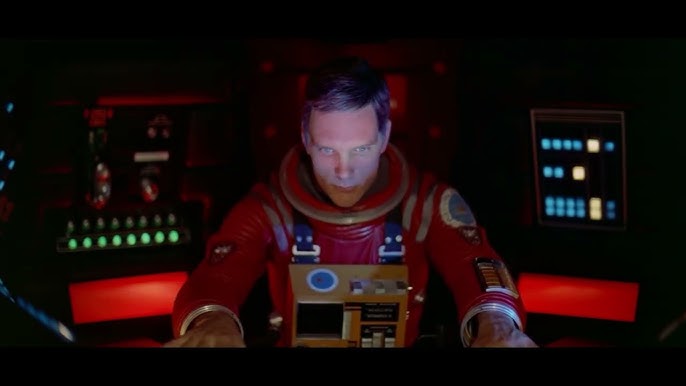🎬 2001: A Space Odyssey (1968)

Chaos and Chuckles: 2001 Unleashes Stanley Kubrick’s Cosmic Conundrum
2001: A Space Odyssey, released April 3, 1968, by MGM, is a $12 million sci-fi epic that grossed $68 million worldwide in its original run, per Box Office Mojo, a slow-build titan co-written by Stanley Kubrick and Arthur C. Clarke, loosely based on Clarke’s 1951 story “The Sentinel.” Directed by Kubrick, it stars Keir Dullea as Dr. David Bowman and Gary Lockwood as Dr. Frank Poole, astronauts probing a monolith’s signal with HAL 9000 (voiced by Douglas Rain). Shot in England’s Shepperton Studios and on location, its 149-minute runtime—sparse on dialogue—won an Oscar for Visual Effects.
The chaos unfolds—dawn apes rage, HAL’s “I’m sorry, Dave” turns lethal, Jupiter’s void spirals, per its $56 million domestic haul (adjusted higher with re-releases). Kubrick, post-Dr. Strangelove, crafts a Metropolis heir—monoliths spark evolution, space bends time. Chuckles, wry, flicker—HAL’s “This mission is too important,” a pen floats in zero-G—dry wit amid dread, per Variety’s “mind-blowing.” Critics split then united; Rotten Tomatoes hit 92%, Metacritic 84/100 (retroactive), with LA Times’s Charles Champlin later calling it “awe-inspiring.” X posts since 2020 marvel “Star Child haunts,” though some yawn “too slow.”
The pacing’s a drift—ape bones fade to ships, HAL’s murder stretches, a stargate dazzles, per Hollywood Reporter. Its $12 million budget—ballooned from $6 million—fueled Geoffrey Unsworth’s lens and pioneering effects, per The Numbers, outpacing Planet of the Apes in vision. It’s Kubrick’s conundrum—chaos of the unknown, chuckles in silence—a cosmic riddle that redefined sci-fi.
The cast is 2001’s sparse orbit, a chaotic crew of quiet power. Keir Dullea’s David Bowman steadies—his “Open the pod bay doors” plea and monolith stare pierce, per Empire’s “stoic.” Gary Lockwood’s Frank Poole drifts—“See you on the way back”—his jog a calm foil, per Roger Ebert’s “everyman.” Their duo—stoic, doomed—grounds the chaos, per Variety. Douglas Rain’s HAL 9000 chills—“I’m afraid I can’t do that”—his soft menace a star, per Rolling Stone’s “unforgettable.”
William Sylvester’s Dr. Heywood Floyd smirks—“Don’t suppose you have any idea what it is?”—per LA Times. Leonard Rossiter’s Smyslov probes, Ed Bishop’s lunar pilot chats. Chuckles hum—HAL’s “Take a stress pill,” Floyd’s sandwich fuss—weaving levity into void, per The Guardian. NY Times hails “Rain’s HAL,” X posts muse “Bowman’s grit,” though some snipe “Cast’s cold.” They’re the conundrum’s pulse—minimal, mesmerizing, masterful.
Visually and sonically, 2001 is a chaotic marvel, a Kubrick cosmos. Geoffrey Unsworth’s cinematography—dawn’s red haze, space’s black sheen—staggers, per Cinematography World. Chaos peaks—monoliths gleam, HAL’s red eye glows, a stargate bends light—shot with $6 million effects (front projection, slit-scan), per Forbes. Ships waltz, bones fly—Letterboxd’s “eternal”—though Collider flags “60s quirks” in 2025 eyes. Kubrick’s Spartacus precision crafts a universe alive, per AV Club’s “transcendent.”
Classical music reigns—Strauss’s “Also sprach Zarathustra” thunders, “Blue Danube” glides, per Soundtrack World’s “iconic.” Sound design—breaths echo, silence deafens—grips, per Rolling Stone’s “revolutionary.” Chuckles whisper—HAL’s “Daisy” croon—amid chaos, per BBC vibe. Flaws? Sound’s stark—Variety’s “jarring”—and visuals bewilder, per NY Times. Still, it’s a sensory odyssey—cosmic chaos, chuckles in the ether.
2001’s strength is its chaotic enigma—a vision that provokes. Dullea’s “haunted” Bowman (Time), Rain’s HAL, and Kubrick’s craft stun; Roger Ebert gave 4/4 for “ultimate trip.” Stakes—man’s leap, machine’s betrayal—mystify, per Empire’s “profound.” Chuckles—Floyd’s “Pretty good coffee”—tease, a 1968 spring jolt post-Graduate, per Box Office Mojo. Its $68 million haul grew with cult love—X posts still ponder “What’s it mean?”—birthing 2010, per Forbes.
Weaknesses linger. The 149-minute runtime drifts—Variety’s “ponderous”—and plot puzzles, per LA Times. Intent eludes—Metacritic’s 84/100 flags “opaque”—and pace tests, per NY Times. Still, it grips; Rolling Stone’s “genius” fits 9.5/10—cosmic, confounding. Legacy? A sci-fi pillar—Interstellar, 4K re-releases, per The Numbers. For thinkers or cinephiles, it’s a must; a conundrum that echoes across time.









